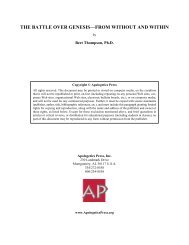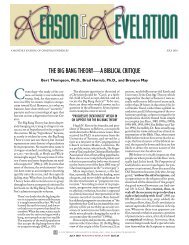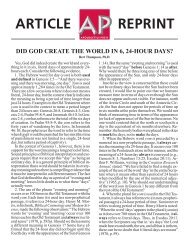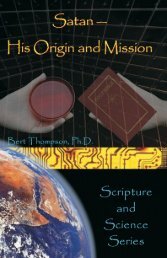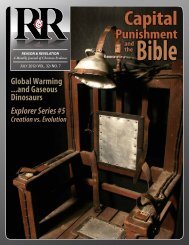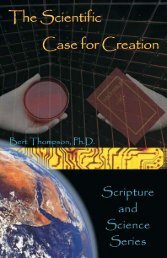The Many Faces, and Causes, of Unbelief - Apologetics Press
The Many Faces, and Causes, of Unbelief - Apologetics Press
The Many Faces, and Causes, of Unbelief - Apologetics Press
You also want an ePaper? Increase the reach of your titles
YUMPU automatically turns print PDFs into web optimized ePapers that Google loves.
<strong>The</strong> idea <strong>of</strong> “process theology” as expressed in its current<br />
form essentially is the brainchild <strong>of</strong> philosopher Alfred North<br />
Whitehead, who penned several influential books on the subject,<br />
including Process <strong>and</strong> Reality (1929), Adventures <strong>of</strong> Ideas<br />
(1933), <strong>and</strong> Modes <strong>of</strong> Thought (1938). For those <strong>of</strong> us who are<br />
non-philosophers (or not even very philosophically oriented),<br />
process theology can seem a little like wading into a gently<br />
flowing creek that unexpectedly turns into a raging torrent.<br />
<strong>The</strong> first few steps do not begin to prepare you for what is yet<br />
to follow. Allow me to explain.<br />
According to Whitehead (<strong>and</strong> other eminent proponents<br />
<strong>of</strong> process theology like Samuel Alex<strong>and</strong>er, Charles Hartshorne,<br />
<strong>and</strong> Schubert Ogden), God is composed <strong>of</strong> two “poles”<br />
(thus, He is “bipolar,” which is why another synonym for panentheism<br />
is “bipolar theism”). First, there is what is known as<br />
His primordial pole, which is eternal, unchanging, ideal,<br />
<strong>and</strong> beyond the world. Second, however, there is what is<br />
known as His consequent pole, which is temporal, changing,<br />
real, <strong>and</strong> identical to the world. <strong>The</strong> primordial nature <strong>of</strong><br />
God is His “potential” pole—i.e., what He can be. <strong>The</strong> consequent<br />
nature is his “actual” pole—i.e., what He actually is at<br />
any given moment. Geisler <strong>and</strong> Brooks have explained this<br />
as follows:<br />
So the world is not different from God; it is one <strong>of</strong><br />
God’s poles. His potential pole inhabits the world<br />
just like a soul inhabits a body. <strong>The</strong>re it becomes actualized<br />
or real. So what the world is, is what God has<br />
become. As such God is never actually perfect; He is<br />
only striving toward perfection.... So God is always<br />
changing as the world changes. He in the process <strong>of</strong><br />
becoming all that He can be (1989, pp. 48,47, emp. in<br />
orig.).<br />
Since God is in the “process” <strong>of</strong> becoming all that He can be<br />
(sounds like the U.S. Army recruitment campaign slogan,<br />
doesn’t it?), the concept is known as “process theology.” And<br />
if you are wondering right about now if this is just a tad convoluted<br />
<strong>and</strong> thus a bit difficult to follow, let me set your mind<br />
-50



